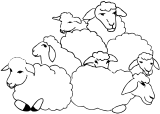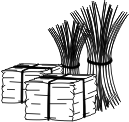1 Samuel
Vengeance Is The Lordís
24:1 - 25:44
Hebrews 10:30
For we know him that hath said, Vengeance belongeth unto me, I will recompense, saith the Lord. And again, The Lord shall judge his people.
KJV
The believer can trust the Lord to judge
the unjust and to reward the righteous.
related reading
Psalm 7
Psalm 18:1-24
Psalm 18:25-50
Psalm 57
Psalm 142
A pious but cranky old lady was greatly annoyed because her neighbors forgot to ask her to go on their picnic. On the morning of the event they suddenly realized their affront and sent a little boy to ask her to come along.
“It’s too late now,” she snapped. “I’ve already prayed for rain.”
—Sunday School Times
Revenge can be ever so sweet. It rolls off the tongue like honey. It increases the heart rate and raises the emotions.
Revenge sits in the pit of the stomach and eats away like a cancer. Revenge, however so sweet, is no fun. Yet, so many of us are like the cranky old lady. We pray for rain.
Look at Saul’s actions through these last several chapters. He just cannot wait to get rid of David. Yet, try as hard as he might, Saul cannot just make that final leap which would allow him to strike down his perceived opponent.
Now it is David’s turn –
Why is it hard to forgive? Why do we take revenge not only on people but on things?
|
Passers-by called police when they saw a man drive his new automobile into the fenders of a parked car. He explained that both cars belonged to him—that he was having revenge on the old car for giving him so much trouble.
—La Liberte
We laugh at the picture of the two cars colliding, but are we not like them? We bang our heads into others, inflicting damage on both ourselves and our target. Not to get bogged down in examples, but one more small illustration will make the point.
A wasp settled on a snake’s head and tormented it by continually stinging. The snake, maddened with the pain and not knowing how else to be revenged on its tormentor, put its head under the wheel of a wagon, so that they both perished together.
—Fables of Aesop
These chapters will demonstrate the true view of vengeance. David knows his God. David realizes God is not only going to reward the righteous, but God will judge the unjust. When a person has faith in his God to this extent, it is easy to forgive. When a person has this degree of faith, it becomes easier not to desire revenge.
 |
Who, when he was reviled, reviled not again; when he suffered, he threatened not; but committed himself to him that judgeth righteously. 1 Peter 2:23 |
Let’s Turn the Tables [24:1 - 22]
Count the number of times in First Samuel where Saul tries to kill David, or have him killed. Yet, God steps in time and again and protects His future king. Now it is David’s turn to go after Saul. David has fled to the wilderness of En-gedi. Saul learns of this and chases after David.
| As “happenstance” would have it, David and his men hide in one of the “sheepcotes.” These are rugged sheep pens, usually in cave areas. The pens are built with a circular wall made of loose stones. The walls discourage thieves and wild animals since they are normally covered with thorns. Frequently, the back of the pens are caves so the sheep or the shepherds may seek some shelter from the weather. It is in one such cave where David hides. |  |
Saul elects to use this particular cave to relieve himself. Saul falls asleep and David’s men desire to kill him (24:4). David dissuades them, but he does cut the fringe from Saul’s robe.
 |
Was it fate or happenstance that Saul chose the exact cave in which David was hiding? God is in control of all things. He may allow events to occur, but only under His watchful eye (Job 1, 2). |
| Think of a “happenstance” in your life. Did you thank God for watching over you? |
No sooner has David accomplished this feat than his conscience smites him. David has disrespected the Lord’s anointed, the current king of Israel. In this sorrowful state, David rebukes his men from wanting to do harm to the king. David will find himself in this same position again in the future. You should watch to see if he has changed his mind about how to treat Saul.
 |
In verse 7 David is said to “stay” his servants. The more modern translations, such as the NIV, use the word “rebuke” here. These terms do not convey the force of the Hebrew. The verb in the Hebrew means to divide, cleave, part, or split. David “tore his men apart.” This must have been a heat, violent discussion over Saul’s fate. Such language shows the strength of David’s ethical views about protecting the one God had appointed as ruler over Israel.
|
 |
In line with ancient customs, with the cutting of Saul’s robe, there is a symbolic transfer of power to David, for David has now “captured” property of the king. Further, Saul’s robe is not now in compliance with the terms of the law (Num 15:38,39; Deut 22:12). These factors may add to David’s sorrow, since he has humiliated Saul in God’s eyes, even if not in man’s eyes.
|
In the morning, after Saul had left the cave, David called to the king. David provided his assurance to the king that he, David, had no intentions of harming the king. Further, David could not understand why the king wanted to harm David. The shepherd’s proof of his statements was the piece of Saul’s robe. David could have killed the king but did not (24:7-13). David’s ethical position is summarized in verse 15:
 |
The LORD therefore be judge, and judge between me and thee, and see, and plead my cause, and deliver me out of thine hand. |
David was trusting in God to resolve the entire matter.
| How often do we take matters into our hands instead of leaving them in God’s care? |
Reflect on 1 Peter 5:6 - 7:
 |
6 Humble yourselves therefore under the mighty hand of God, that he may exalt you in due time: 7 Casting all your care upon him; for he careth for you. |
Saul’s response is found in verses 15-22. The king lifted his voice and wept. He spoke the words of forgiveness. The question to ask, though, is one of sincereness. Does the king mean what he says?
If Saul truly meant what he said, where is the spiritual revival? Is revival not part of true forgiveness? What did David think about Saul’s repentance? Why do you respond they way you have? Consider 24:22. |
An Evil Man, a Good Woman [25:1-44] |
 |
The overriding tone of this chapter is set in the opening verse. Samuel dies. What a loss this must have been to Israel and to David in particular. Then, immediately, the focus of the chapter drops away from Samuel and turns to David and more trouble.
Sheepshearing time was a time of festivals and goodwill. Nabal was one such Israelite who enjoyed this season. Rich, with herds and land, Nabal throws a great feast for himself and his friends (25:36). Scripture describes it as a feast fit for a king.
One of the reasons Nabal could hold such a feast, is that during the rest of the year David’s men had been protecting Nabal’s flocks, shepherds, and other possessions. It seemed only natural to David that Nabal would want to “repay” this kindness by sharing some of the goodwill of this season (25:5-9).
Nabal had other ideas. The rancher’s name means “fool.” As with many other characters in the Bible, Nabal is well-named! He flat-out denies David’s request and sends the men home empty handed. David’s blood boiled! He wanted to kill Nabal right there on the spot.
| Why would David seek vengeance on Nabal when in the last chapter he refused to kill Saul? |
Notice Nabal’s basic attitude. “Shall I then take my bread, and my water, and my flesh that I have killed for my shearers, and give it unto men, whom I know not whence they be? (25:11).” Where’s his focus? David was insulted by Nabal’s attitude, as well might be expected. Still, Scripture teaches that we are to “recompense to no man evil for evil. Provide things honest in the sight of all men. Be not overcome of evil, but overcome evil with good” (Romans 12:17, 21). David is just as wrong with his attitude as is Nabal with his.
| Now comes the women on the white horse, or rather on a slow donkey. Abigail hears of her evil husband’s deeds. She quickly prepares food for David and his men. She carries these provisions off to him. Upon coming upon David, she humbles herself in the shepherd’s presence. Abigail could have clearly chosen to protect herself and let David kill her evil husband. Instead, she goes out on a limb in an effort to recompense for the good (25:23-31). Abigail even reminds David that vengeance belongs to the Lord! |  |
 |
In explaining to Abigail the presence of David and his men, Nabal’s servants describe the shepherd’s band as a “wall” by both day and night (25:16). The Hebrew word translated “wall” is the same Hebrew used in the crossing of the Red Sea during the Exodus. “And the children of Israel went into the midst of the sea upon the dry ground: and the waters were a wall unto them on the their right hand, and on their left” (Exod 14:22). This usage shows the provision of protection David and his men had displayed toward Nabal. |
David is struck by Abigail’s words. Her counsel is wise and godly. David praises God for having sent her his direction ((25:34). David’s and Abigail’s faith is rewarded, for when Abigail tells Nabal of what she has done, he suffers a stroke and shortly dies. After the period of mourning, David takes Abigail to be his wife.
 |
Abigail’s speech is the longest discourse in the Old Testament by a woman, being 153 Hebrew words. Deborah’s song is longer, 352 words, but it is song by both Deborah and Barak. |
| Why would a godly woman like Abigail have married so unrighteous a man as Nabal? | |
 |
Nabal is from the family of Caleb. Remember that Caleb was one of the two spies who wanted to go forth on faith and invade the Promised Land shortly after the Israelites came forth out of Egypt. Caleb is portrayed in Scripture as a man of great faith and consistent obedience (Num 13:1-6; 14:24; Joshua 14:6-15).
|
Is there a lesson here for those of us dealing with children or grandchildren? What happened in Nabal’s life with all of this good “Christian” heritage? |
Abigail presents an interesting study. Saul had given David’s first wife Michal to another man (25:44). It appears that at this time Abigail was David’s only wife. God had provided a wonderful, wise helpmeet to David. She would compensate for David’s loss of both Samuel and Michal. She becomes a picture of salvation for David after Samuel’s death. She is the picture of true submission. She has subordinated her own interests for those of, first, Nabal, then David. She is a woman David can respect and love. God has certainly provided for David’s needs at a time when David was desperately in need. Abigail illustrates the principal that submission to God leads to submission to our fellow men.
 |
Submission to God’s leading varies from one person to the next and from one place and time to another. God does not expect each of us to all do the same things. After all, collectively, we are the body of Christ. Each part acts differently than the other. The center of this response and submission is God’s will for our individual life. |
| In what areas of your life do you see God’s leadership? | |
 |
David is shown to be godly but not perfect. No sooner has he found the perfect helpmeet than his lusts lead him to a second wife, Ahinoam. This is a clear violation of Deuteronomy 17:17 against kings multiplying wives, not to mention being a violation of God’s fundamental rule for marriage – one man and one woman. David would pay for the sins of polygamy. |
![]()
 |
David’s heart was right with God, but David strayed when he followed his own lusts rather than the desires of God’s heart. |
When was the last time you followed after your own lusts? What were the consequences?
|
|
 |
Ahinoam would give David a son, Amnon. Amnon would rape his half-sister, Tamar. Tamar’s brother Absalom would kill Amnon. Absalom was so rebellious because of David’s treatment of him following this event, that Absalom attempted to capture the throne in a coup d’etat (2 Samuel 13-15).
|
 |
5 Trust in the LORD with all thine heart; and lean not unto thine own understanding. 6 In all thy ways acknowledge him, and he shall direct thy paths. Proverbs 3:5,6 |
| Do you do this? |
